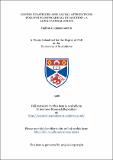Files in this item
Coping strategies and causal attributions following myocardial infarction : a longitudinal study
Item metadata
| dc.contributor.author | Gudmundsdottir, Hafrun | |
| dc.coverage.spatial | 290 p. | en_US |
| dc.date.accessioned | 2018-05-25T08:01:52Z | |
| dc.date.available | 2018-05-25T08:01:52Z | |
| dc.date.issued | 1996-07 | |
| dc.identifier.uri | https://hdl.handle.net/10023/13534 | |
| dc.description.abstract | Coping strategies and causal attributions have been shown to be related to recovery and adjustment following illness. Certain coping strategies and causal attributions, such as avoidant coping and other blame have been found to be related to higher levels of distress while others, like behavioural self blame and attention coping have been shown to be related to lower distress. There have however, been few longitudinal studies of the process. The study described here examined coping strategies, causal attributions and levels of distress over a period of 1 year in 91 patients following a first myocardial infarction (MI). Coping strategies (measured by the COPE), causal attributions (measured by open ended questions and a check-list) and distress (measured by the HAD a measure of anxiety and depression with minimal somatic symptoms), were measured within 2 weeks of discharge and at 2, 6 and 12 months post MI. The main findings of the study showed that both coping strategies and causal attributions changed over time. Patients were most likely to use attention coping strategies early following the illness onset but more avoidant and religious coping later on. Patients made fewer attributions as time passed and the most commonly reported causal attributions were stress and smoking. Results further revealed that both coping strategies and causal attributions were either concurrently related to and/or predictive of levels of distress. Avoidant coping was related to higher distress at all assessment times. Furthermore, both characterological self blame and other blame were found to be concurrently related to higher distress, with characterological self blame also being predictive of subsequent higher distress. These findings have implications for care and rehabilitation of cardiac patients as they imply that certain causal attributions and coping strategies might be problematic as regards post MI distress. This points towards the importance of examining and if necessary, altering certain causal attributions and coping strategies in order for the patient to gain the best possible recovery. | en_US |
| dc.language.iso | en | en_US |
| dc.publisher | University of St Andrews | |
| dc.subject.lcc | RC682.G9 | |
| dc.subject.lcsh | Heart--Diseases--Psychological aspects | |
| dc.title | Coping strategies and causal attributions following myocardial infarction : a longitudinal study | en_US |
| dc.type | Thesis | en_US |
| dc.contributor.sponsor | British Heart Foundation | en_US |
| dc.contributor.sponsor | British Overseas Research Student | en_US |
| dc.type.qualificationlevel | Doctoral | en_US |
| dc.type.qualificationname | PhD Doctor of Philosophy | en_US |
| dc.publisher.institution | The University of St Andrews | en_US |
This item appears in the following Collection(s)
Items in the St Andrews Research Repository are protected by copyright, with all rights reserved, unless otherwise indicated.

